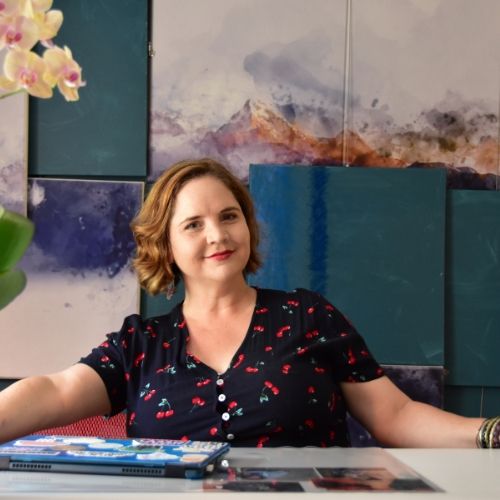I am NOT that therapist
Apr 08, 2025
If you’ve ever watched a TV show or movie featuring a therapist, you’ve probably noticed a few common themes:
- The therapist is either cold and detached or so deeply involved in their clients' lives that they’re practically best friends.
- Sessions involve big, dramatic breakthroughs every time.
- The therapist gives direct advice, solving problems like a wise oracle.
- Therapy is fast—a few sessions, and the client is magically transformed.
Sounds appealing, right? The idea that you could show up, spill your thoughts, get a life-changing insight, and walk away fully healed?
Well, here’s the truth: I am not that therapist.
Therapy—real therapy—is not like what you see in the media. And while I completely understand why these portrayals exist (they make for great entertainment), they can also set up unrealistic expectations about what therapy - or therapists - are actually like.
So, let’s break it down. If you’re thinking about working with me—or you’re already a client—you should know what to expect.
I Will Not Tell You What to Do (Except When I Will)
Many fictional therapists hand out advice like they’re your best friend who just happens to have a psychology degree. They say things like:
- “Leave him. He’s not good for you.”
- “You should quit your job and follow your passion.”
- “Just set boundaries with your toxic family.”
And while those statements might sound empowering, real therapy doesn’t work that way—at least, not most of the time.
Here’s why: My job is not to decide your life for you. My job is to help you figure out what you want, what aligns with your values, and what choices will serve you best.
That said, there are absolutely times when I will express my opinions or press you to explore something more deeply. If I think your reasoning isn’t adding up or there’s something else going on beneath the surface, I’m going to call attention to it. If I suspect you’re avoiding something difficult, I will challenge you to face it.
And if we are dealing with eating disorder treatment, issues of safety, or serious health risks, I will tell you what to do—because sometimes, you do need someone to step in and say, "This is dangerous, and here’s what needs to happen." If I believe you need medical support, a dietitian, or another specialist, I will tell you outright and help you figure out what’s next.
Additionally, I will express my own values and emotions if I think it might clarify something for you or be useful to your growth. My emotions and values are important too, and I’m not going to pretend otherwise. That doesn’t mean we have to agree on everything—I am capable of holding conflicting opinions and emotions while still maintaining a healthy, professional relationship.
In fact, sometimes conflict is necessary for change. Therapy isn’t about agreeing all the time—it’s about being honest, challenging unhelpful beliefs, and sometimes sitting with discomfort in order to grow, heal, and reach your goals. If we never had moments of disagreement or tension, it would mean we weren’t really getting into the hard work of transformation.
So, no—I won’t tell you exactly how to live your life. But I will push you, question you, challenge you, and advocate for your health and well-being when it matters most.
I Will Not Become Your Best Friend
In shows like Shrinking, the therapist is so emotionally involved with their clients that they cross every professional boundary imaginable. They’re texting outside of sessions, showing up at their clients’ homes, and giving them highly personal opinions about their lives.
That’s not how ethical therapy works.
Do I deeply care about my clients? Absolutely.
Will I be direct, supportive, and compassionate? Yes.
Will I come over to your house and help you break up with your partner? Nope.
I keep clear boundaries because therapy works best when I am your therapist—not your friend.
- Friends tell you what you want to hear.
- A therapist challenges you to think in new ways and explore uncomfortable truths.
- Friends vent with you about life.
- A therapist helps you understand your emotions, patterns, and how to make changes.
Boundaries don’t mean I don’t care. They mean I care enough to respect our work together.
Therapy Is Not a 3-Session Miracle Cure
Hollywood loves big breakthroughs.
- The client has a major realization and walks away forever changed.
- Trauma is “solved” after one emotional conversation.
- The therapist delivers a single insight that completely changes the client’s life.
I wish therapy worked that way. But real change takes time.
- If you’ve struggled with body image for 20+ years, it’s going to take more than one session to unlearn diet culture’s lies and build self-compassion.
- If you’ve survived trauma, healing isn’t about one big revelation—it’s about slowly processing emotions, building safety in your body, and developing coping tools.
- If anxiety has been running your life, it takes practice to learn how to regulate your nervous system and break free from the cycle of self-doubt.
Therapy is a process. Some weeks you might leave feeling like, Wow, that really helped. Other weeks, you might leave thinking, Ugh, I don’t even know if I got anything out of that.
But I promise: If you show up, do the work, and give yourself grace and patience, real, lasting change will happen.
I Will Not Be Distant or Detached
Some therapists in media (Dr. Sharon Fieldstone from Ted Lasso) are incredibly skilled but emotionally distant. They say all the right things, but they feel…disconnected.
That’s not me.
- I laugh with my clients when humor is appropriate.
- I validate hard emotions because I know how painful they can be.
- I bring authenticity, and humanity into sessions—because healing isn’t just about intellectual insight. It’s about connection.
That being said…
- I don’t sugarcoat things. If something isn’t serving you, I will gently challenge you.
- I won’t pretend everything is fine. If you’re struggling, we’ll talk about it—even if it’s uncomfortable.
- I will push you toward self-compassion. You are not a failure. You are not “broken.” You deserve care, not self-judgment.
Therapy isn’t just about talking through problems—it’s about helping you truly believe in your own worth.
I Will Challenge Society’s BS (Especially Around Body Image, Productivity, and “Success”)
Most TV and movie therapists focus on individual issues—relationships, childhood trauma, anxiety. But very few challenge the toxic societal messages that impact mental health.
Here’s what you should know about working with me:
- I reject diet culture. I will never tell you to shrink yourself to be worthy.
- I reject hustle culture. You do not need to “earn” rest.
- I reject toxic positivity. You don’t need to be grateful all the time. You get to have real emotions.
- I challenge perfectionism. You are allowed to be human.
We don’t exist in a vacuum. Our beliefs about our bodies, our worth, and our success are shaped by a society that often profits from our insecurity.
Part of therapy with me is learning to challenge these narratives—so you can define self-worth on your own terms.
So… What Is Therapy With Me Actually Like?
- It’s curious and supportive, but I keep clear ethical boundaries.
- It’s a process, not a quick fix.
- It’s about change, not just talking about problems.
- It’s rooted in self-compassion and evidence-based approaches.
- It challenges toxic societal norms, not just personal struggles.
If you want quick advice, a best friend, or a magic breakthrough, I’m not that therapist.
If you want real growth, self-compassion, and the tools to navigate life with more clarity and resilience, I’m here.
Therapy isn’t about changing who you are.
It’s about coming home to yourself—with more kindness, courage, and understanding than ever before.
And that?
That’s better than any Hollywood version of therapy ever could be.
Resources & Links
- What are Your Values? - August 2023
- Making a Realistic Self Care Plan - April 2024
- Forget New Year’s Resolutions: Build a Life You Actually Like, Year After Year - January 2025
- The Push/Pull of Therapy - Navigating the Gray Areas of Diet Culture & Change - December 2024
- Feng Shui Therapy - March 2023
- Psychology Today
- Verywell Mind



